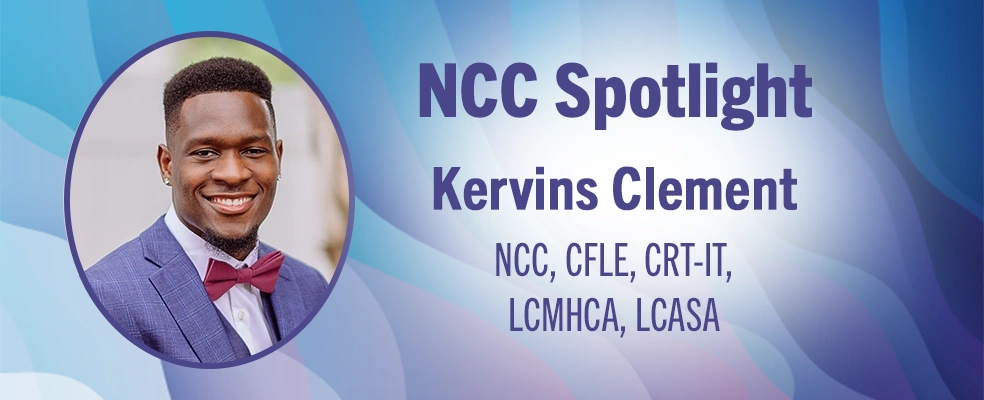Kervins Clement, NCC, CFLE, CRT-IT, LCMHCA, LCASA, faced many challenges as the youngest of four siblings growing up in Immokalee, Florida. The son of Haitian immigrants, he says he often felt like the black sheep of the family and suffered from dyslexia and ADHD, disorders he didn’t understand until later in life.
“Having different learning abilities haunted me during my early school years and I felt isolated,” he says. For lack of an emotional outlet, he began playing football during his sophomore year of high school.
While he was a student at the University of Florida, he thought about pursuing a career in the NFL, but after considering his childhood and the kindness of people who helped him along as a young man, he decided he wanted to help people instead.
“I knew that I wouldn’t be the person I was if there weren’t people who decided to invest in a kid from Florida who had no idea what was in front of him—people who said, ‘I believe in you’ and helped me to understand that I wasn’t alone. Sometimes people aren’t attuned to their voice and their power, but once they are, they can begin to accomplish great things.”
After talking to his academic advisor, he soon made the decision to become a counselor. He earned his bachelor’s degree in family, youth, and community sciences with a minor in business administration and a certification for family life education from the University of Florida. Next, he received his Master of Education and Education Specialist degrees in marriage and family counseling from the university.
Clement is currently pursuing his PhD in counseling and counselor education at the University of North Carolina at Greensboro and is a Licensed Clinical Mental Health Counselor Associate and a Licensed Clinical Addiction Specialist Associate. He specializes in counseling clients with love and sex addictions.
“I chose that area of focus because I saw how it devoured my family,” he says. “It wrecked my parents’ relationship, but they didn’t have the language for what was happening then. I believe a large part of the reason we have a mental health crisis is because there is not enough education about mental health and how it impacts communities.”
Understanding sexual health was a challenge that he needed to tackle, he says.
“I had to shatter my idea of what sexual health meant and change my definition, because I come from a Christian background, and because of the realm I was stepping into.” Many of the clients he sees feel guilt, shame, and loneliness about behaviors such as viewing pornography because of their upbringing. “Through my training, I’ve realized that a lot of people don’t understand the difference between moral incongruency and sex addiction,” Clement says.
Some clients are relieved to discover that they are not addicts, while others have lost their families or jobs, contracted diseases, depleted their bank accounts, and even put their lives in danger. “People addicted to sex are not people who are exploring their sexuality,” he says. “They are a community of people who have lost control and want to live a more whole, loving, and connected life.”
The pandemic intensified the struggle for many sex addicts, Clement says.
“We are living in a very sexualized society, and anyone can access sexual material anywhere. During COVID-19, everyone was isolated, and for many this became a coping mechanism, just as it could with drugs or alcohol. We talk about the three A’s: accessibility, anonymity, and affordability as factors. Sexual materials are available everywhere; the behavior can be a secret; and it’s all free.”
Love addiction is more romantically driven, though sex can be involved, he says.
“I see many clients who are frequently in and out of toxic relationships because they are seeking that connection. ‘I thought that person was the one for me’ is a common narrative. Love addiction affects single people and married couples, even those in open relationships. Many are stuck in a cycle; they fall in love, their partner may become emotionally unavailable, they do something to cope, and it happens again and again. For many it’s an effort to control their environment or to feel a sense of connection.
Clement strives to reduce the stigma associated with addictions to love and sex by speaking to counselor educators, clinicians, and clients. He enjoys providing clarity through presentations surrounding those topics. He also provides clinical services to people who struggle in those areas and supervision to master’s students at UNC-Greensboro.
“I am providing a clear understanding of what these addictions are,” he says, “because the question for counselors is not whether you will see them, but will you be able to recognize them when you do?”
Clements is a 2021 NBCC Minority Fellowship Program (MFP) Fellow and has won several awards, including a 2021–2022 Empowerment Scholarship from the International Institute for Trauma and Addiction Professionals, the 2022 Outstanding Graduate Student Award from the International Association of Addictions and Offender Counselors, and the 2022 Smiley Award from UNC-Greensboro for being a Global Education Ambassador.
His mission is to help his clients find freedom, which means more than counting the “good” days or the absence of relapses, Clement says.
“I am using my clients’ voices and allowing them to speak to the hearts of clinicians, and for me that is something I take with huge gratitude,” he says. “This is about advocacy, and people being able to live a life where they feel whole, loved like they never have, connecting with people, being emotionally vulnerable, feeling full and not empty. One person at a time, I am doing something that’s greater than myself, and I believe all of those things are counseling in its essence.”
Spotlight is an occasional feature on nationally certified counselors with a story to share. Feel free to send your ideas for Spotlight candidates to newsletter@nbcc.org.

